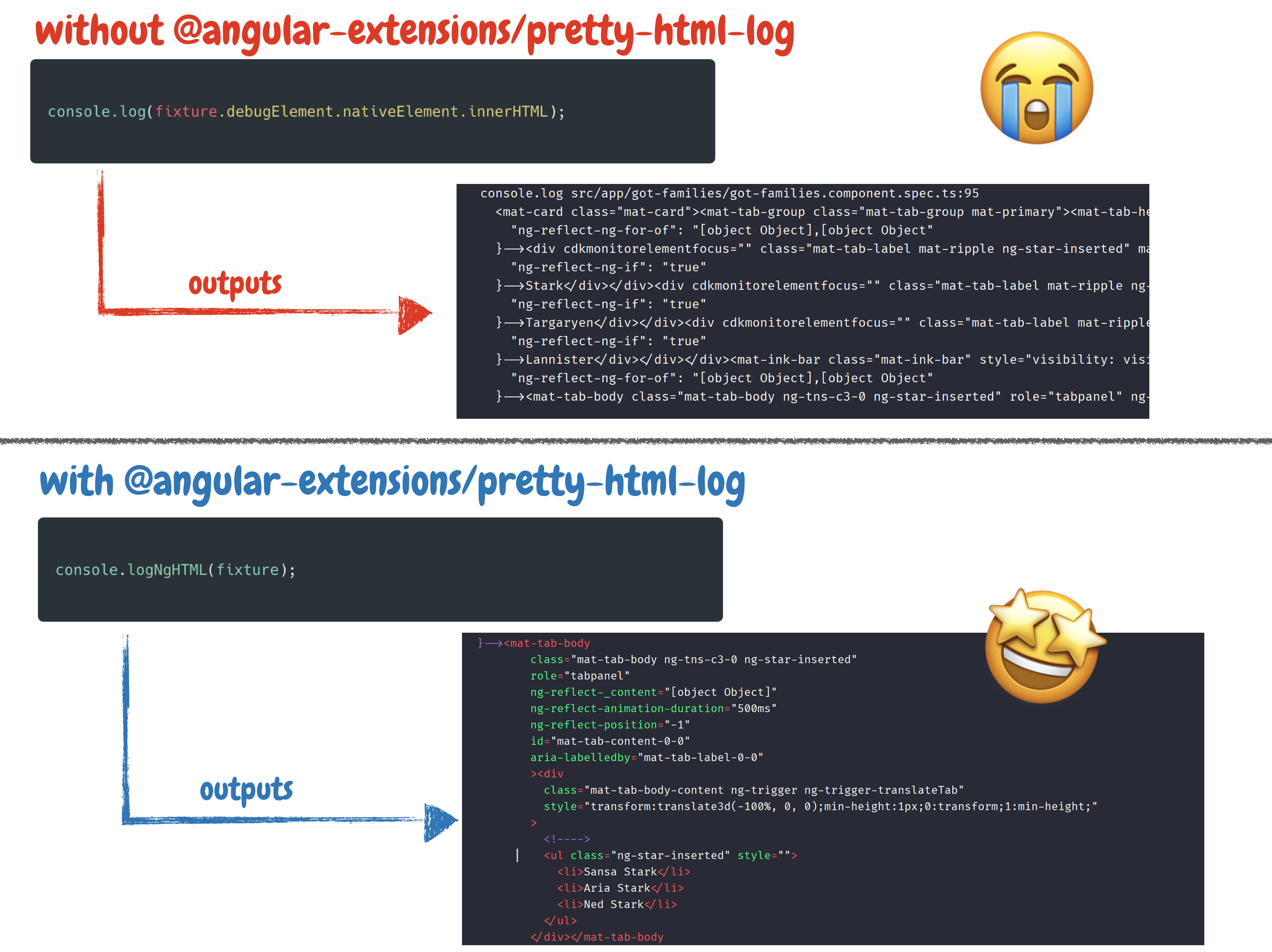https://github.com/angular-extensions/pretty-html-log
A module that allows you to pretty print the inner HTML of ComponentFixtures, DebugElements, NativeElements or even plain HTML strings to the console. This is very useful for debugging Angular component tests in Jest
https://github.com/angular-extensions/pretty-html-log
Last synced: 8 months ago
JSON representation
A module that allows you to pretty print the inner HTML of ComponentFixtures, DebugElements, NativeElements or even plain HTML strings to the console. This is very useful for debugging Angular component tests in Jest
- Host: GitHub
- URL: https://github.com/angular-extensions/pretty-html-log
- Owner: angular-extensions
- License: mit
- Created: 2019-10-15T15:27:48.000Z (over 6 years ago)
- Default Branch: master
- Last Pushed: 2024-07-12T16:35:27.000Z (over 1 year ago)
- Last Synced: 2025-06-02T10:46:23.172Z (9 months ago)
- Language: TypeScript
- Homepage:
- Size: 9.36 MB
- Stars: 38
- Watchers: 3
- Forks: 0
- Open Issues: 18
-
Metadata Files:
- Readme: README.md
- Changelog: CHANGELOG.md
- License: LICENSE
- Code of conduct: CODE_OF_CONDUCT.md
Awesome Lists containing this project
- fucking-awesome-angular - pretty-html-log - Module for pretty-printing ComponentFixtures, DebugElements, NativeElements, or HTML strings in Jest Angular tests. (Third Party Components / Loggers)
- awesome-angular - pretty-html-log - Module for pretty-printing ComponentFixtures, DebugElements, NativeElements, or HTML strings in Jest Angular tests. (Third Party Components / Loggers)
README
# @angular-extensions/pretty-html-log
**Improved debugging of Angular component tests with Jest!**
> The @angular-extension/pretty-html-log is a module that makes debugging component tests with Jest a breeze.
> It adds a `phl` method which pretty prints the _innerHTML_ of a `ComponentFixture`, a `DebugElement`, a `NativeElement` or an HTML string.

- [Why you should use this module](#why-you-should-use-this-module)
- [Features](#features)
- [Getting started](#getting-started)
- [Installation](#installation)
- [Usage](#usage)
- [Usage via import](#usage-via-import)
- [Usage via globals](#usage-via-globals)
- [API](#api)
- [Examples](#examples)
- [Pass in specific DebugElement](#pass-in-specific-debugelement)
- [Examples](#examples-1)
- [Print Angular comments](#print-angular-comments)
- [Change the theme](#change-the-theme)
- [Further resources](#further-resources)
- [Blog post](#blog-post)
- [Video tutorial](#video-tutorial)
## Why you should use this module
When debugging component tests, it’s often necessary to inspect the DOM. The most common approach to do so is by using the good old `console.log` which has some downsides.
First of all, it’s annoying to always type
```typescript
fixture.debugElement.nativeElement.innerHTML;
```
Moreover, the `console.log` statement doesn’t print the HTML in a very readable way. Therefore we still need to copy the string in a new HTML file and format it to be able to inspect it. Not with **@angular-extensions/pretty-html-log**!

## Features
- Provides a `phl` method that highlights and pretty prints a `fixture`, `debugElement`, `nativeElement` or even a plain HTML string - you don't have to worry how to get to the HTML, just pass the thing you want to print to the `phl` method.
- in case you are using prettier (which you should ;)), pretty-html-log will pick
up your prettier config and pretty print the HTML string based on your prettier configuration. 🤩
## Getting started
### Installation
This module will only be used during development and can therefore be installed as a dev dependency.
```
npm i -D @angular-extensions/pretty-html-log
```
### Usage
pretty-html-log can be used in two different ways. The first and most
simple way is to simply import the `phl` function into your test.
#### Usage via import
The `@angular-extensions/pretty-html-log` package provides a `phl` method that you can use to pretty print a `fixture`, `debugElement`, `nativeElement` or even a plain HTML string. Simply import it while debugging and pretty print that HTML.
```typescript
import { phl } from '@angular-extensions/pretty-html-log';
describe('my test suite', () => {
it('should be green', () => {
phl(fixture); // This will pretty print the fixture
expect(myTable.getRows()).toBe(5);
});
});
```
Importing the phl function is straightforward. However, since phl is often used as a temporary tool, it can be bothersome to add an import at the top of the file. This is easy to forget and requires manual cleanup afterward.
Wouldn't it be cool if we can simply use the `phl` function without the need of an import. Let's check out how to setup the `phl` function globally.
> To make sure unused import statement get cleaned up we should configure our eslint to clean up unused imports. More: https://www.npmjs.com/package/eslint-plugin-unused-imports.
#### Usage via globals
To make `phl` globally available, import and run the following method within a `jest.setup.ts` file.
```typescript
import { setupPhl } from '@angular-extensions/pretty-html-log';
setupPhl();
```
## API
The `phl` method has the following signature:
```typescript
(
ngHTMLElement: NgHTMLElement,
enableComments = false,
theme = THEMES.DRACULA
)
```
| Property | Description |
| ------------------------------- | ------------------------------------------------------------------------------------------------------------------ |
| ngHTMLElement | Value to extract the html from and pretty print it to the console: ComponentFixture | DebugElement | DebugElement[] | HTMLElement | HTMLElement[] | string; |
| enableComments (default: false) | When set to true we print the generated comments by Angular. For example: